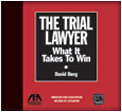Publications & Presentations
Run Brother, Run: A Memoir of a Murder in My Family
From a renowned trial lawyer, a searing family memoir of a wild boyhood in Texas that led to the vicious murder of the author’s brother by actor Woody Harrelson’s father.

A searing family memoir of a tempestuous Texas boyhood that led to the vicious murder of the author’s brother As William Faulkner said, “The past is not dead, it’s not even past.” This observation seems especially true in matters of family, when the fury between generations is often never resolved and instead secretly carried, a wound that cannot heal. For David Berg, this is truer than for most, and once you read the story of his family, you will understand why he held it privately for so long and why the betrayals between parent and child can be the most wrenching of all.
In 1968 David Berg’s brother, Alan, was murdered by Charles Harrelson, a notoriou
s hit man and father of actor Woody Harrelson. Alan was only thirty-one when he disappeared; six months later his remains were found in a ditch in Texas. Run, Brother, Run is Berg’s story of the murder. But it is also his account of the psychic destruction of the Berg family by the author’s father, who allowed a grievous blunder
at the age of twenty-three to define his life. The event changed the fate of a clan and fell most heavily on Alan, the firstborn son, who tried to both redeem and escape his father yet could not.
This achingly painful family history is also a portrait of an iconic American place,
playing out in the shady bars of Houston, in small-town law offices and courtrooms, and in remote ranch lands where bad things happen—a true-crime murder drama, all perfectly calibrated. Writing with cold-eyed grief and a wild, lacerating humor, Berg tells us first about the striving Jewish family that created Alan Berg and set him on a course for self-destruction and then about the gross miscarriage of justice that followed.
As with the best and most powerfully written memoirs, the author has kept this horrific story to himself for a long time. A scrappy and pugnacious narrator, Berg takes his account into the darkest human behaviors: the epic battles between father and son, marital destruction, reckless gambling, crooked legal practices, extortion, and, of course, cold-blooded murder. Run, Brother, Run is a raw, furious, bawdy, and scathing testimonial about love, hate, and pain— and utterly unforgettable.
Purchase your own copy of Run, Brother, Run on Amazon today.
Now available, The Trial Lawyer: What it Takes to Win, Second Edition (© ABA 2018)
By David Berg
The ABA recently published the Second Edition of David’s entertaining and instructive bestselling book on every trial skill, complete with war stories, excerpts from his trials and those of his colleagues—including how Joe Jamail won a $10.5 billion verdict for Pennzoil (the largest verdict ever affirmed on appeal) and how he and his BA team won a trade mark infringement case for comic genius and entrepreneur Dan Aykroyd’s company, Crystal Head Vodka, after the case had been lost by a previous law firm.
Imagine you could take an experienced trial partner with you wherever you went. That is the premise of The Trial Lawyer: What It Takes to Win by David Berg. The book, now in its second edition, provides advice on every stage of trial work. – Andrew J. Kennedy, Litigation News. Read More.
- Buy the Second Edition at the ABA Store: https://www.americanbar.org/products/inv/book/320406279/
- You can also buy David’s lecture on jury selection and cross-examination for one hour CLE credit at the same ABA Store address,https://www.americanbar.org/products/inv/book/320406279/
- David’s book is excerpted in the ABA’s Litigation Journal, Fall Edition, found at https://www.americanbar.org/groups/litigation/publications/litigation_journal/2018-19/fall/the-trial-lawyer/
 Earn 2.5-3 hours of CLE credit by viewing How To Win Big At Trial, a 2 hour presentation by David Berg and his law partner and close friend, Jim Quinn, which focuses on strategy and technique covering every trial skill, including how to take a meaningful deposition, available at https://www.nacle.com/
Earn 2.5-3 hours of CLE credit by viewing How To Win Big At Trial, a 2 hour presentation by David Berg and his law partner and close friend, Jim Quinn, which focuses on strategy and technique covering every trial skill, including how to take a meaningful deposition, available at https://www.nacle.com/- Earn one hour credit by listening to David Berg’s hour-long ABA lecture on jury selection and cross-examination, which can be found at the same URL as the book, https://www.americanbar.org/products/inv/book/320406279/
- View David Berg’s ten-segment “Jamail Talk,” discussing the late “King of Torts” $10.5 billion verdict in Pennzoil v. Texaco–how he won it and what we can learn from it–on the B&A YouTube site, https://www.youtube.com/channel/UCvpkPGZ6pLWny_Xwk9CZB2g
Editor’s Note: Litigation is published by The Journal of The Section of Litigation, American Bar Association. This volume was subtitled “Perspective.”
Excerpt: The Atlantic is calm today. The beach, rearranged by a tropical storm, is incredibly wide and white. Before I cast, I use pliers to clamp down the barbs on my hook.
Blind Cross-Examination
By David Berg
Editor’s Note: Litigation is published by The Journal of The Section of Litigation, American Bar Association. This volume was subtitled “Surprises.”
Preparing Witnesses
By David Berg
Editor’s Note: Litigation is published by The Journal of The Section of Litigation, American Bar Association. This volume was subtitled “Morals and Manners.” Excerpt: A Texas tort lawyer recently won an $8.5 million verdict for the owner of a deceased stud bull, felled midstream of an enviable career by cruel circumstance and an apparently lethal pesticide.
Secrets of Cross-Examination
By David Berg
Editor’s Note: Litigation is published by The Journal of The Section of Litigation, American Bar Association. This volume was subtitled “Secrets.” Excerpt: There are many secrets of fly fishing, but the essence of each of them is to listen to your instincts: They become more reliable each time you cast.
LEGAL
“The Trial Lawyer,” Litigation Magazine, Summer 2005
“Trade Secrets of the Silver Bullet (Excerpt from The Trial Lawyer: What It Takes to Win),” The American Lawyer, October 2003
“The Trial Lawyer,” Litigation Magazine, Spring 2000
“Timing in Cross-Examination,” Litigation Magazine, 1996
“Secrets of Cross Examination,” Litigation Magazine, Spring 1994
“Is Lawsuit Abuse a Problem,” Houston Metropolitan, September, 1993
“In Defense of Trial Lawyers – and Juries,” Los Angeles Times, February 10, 1993
“Blind Cross Examination,” Litigation Magazine, Fall 1990
“The Frenzy in Friendswood: What About Probable Cause” The Houston Post, May 15, 1988
“Lawyers are Better than That,” The Houston Post, February 6, 1988
“Censorship Decision is Dangerous,” The Houston Post, January 17, 1988
“Preparing Witnesses,” Litigation Magazine, Winter 1987
“Cross Examination,” Litigation Magazine, 1987
“Ruling Trespasses on Confidentiality,” The Texas Lawyer, August 31, 1987
“RICO: As Pernicious As the Crimes it Targets,” The Texas Lawyer, April 6, 1987
“What the Civil Practitioner Needs to Know About RICO (Part 2)” (with Joel M. Androphy), The Texas Bar Journal, February 1987
“What the Civil Practitioner Needs to Know About RICO (Part 1)” (with Joel M. Androphy), The Texas Bar Journal, January 1987
“The Comprehensive Crime Control Act of 1984,” Houston Lawyer, April 1986
“Commercial Racketeering: What the Civil Practitioner Needs to Know and Understand,” Houston Lawyer, May 1985
“Best Article of 1984,” (with Joel M. Androphy), The Texas Bar Journal, 1984
“The Day The Grand Jury Ran Amok,” HoustonCity Magazine, August 1984
“Prudence and Jury Duty,” The Houston Post, June 2, 1984
“The RICO Statute, 18 U.S.C. § 1061-1968: The Business Client as Racketeer,” (with Philip D. Zeltkow), The Texas Bar Journal, February 1982
“The FBI’s Threat to Freedom,” Los Angeles Times, February 27, 1981
“Is There a Special Loathing for Lawyers?” Houston Chronicle, September 29, 1979
“If You Dislike Lawyers, Read This,” The New York Times, August 20, 1979
POLITICAL/PERSONAL
“Texas Democrats Can Send a Message of Sanity Today,” The Houston Chronicle, March 2008
“Road to Redemption for Clintons: Embrace Obama,” The Houston Chronicle, February 2008
“Please Note, Your Wild Rhetoric is Not Helping,” The Houston Chronicle, June 12, 2005
“My Favorite Teachers,” The Houston Post, 1992
“Summit Won’t Fix What Ails U.S.,” The Houston Chronicle, July 8, 1990
“What Dr. King is Still Teaching Us,” The Houston Post, January 22, 1989
“All the Hearts That Never Will Mend,” The Houston Post, November 22, 1988
“Too Much Democracy,” The Houston Post, November 13, 1988
“Something Special Happened in Houston,” The Houston Post, July 14, 1988
“Southern Baptists’ Stance on AIDS Goes Too Far,” The Houston Post, July 14, 1988
“Fathers, Sons, and Hidden Feelings,” The Houston Post, June 19, 1988
“The Play’s the Thing, but not at SJC,” The Houston Post, April 23, 1988
“Edgar Speakes, Charlie McRegan,” The Houston Post, April 10, 1988
“The Devils Made Me Do It,” The Houston Post, April 10, 1988
“We Must Set Economic House in Order,” The Houston Post, March 6, 1988
“Market Crash Was Not a Coincidence,” The Houston Post, March 5, 1988
“Why Cuomo is Still Best Bet,” The Houston Post, January 8, 1988
“Mr. McLuhan, Where are You When we Really Need You?” The Houston Post, December 30, 1987
“Paul Always Had a Theory,” The Houston Post, December 23, 1987
“Racism and Justice: The Brandly Case,” The Texas Lawyer, November 2, 1987
“The New Hite Report: Lite Research,” The Houston Post, October 17, 1987
“Media Must Avoid Invading Privacy,” The Texas Lawyer, June 15, 1987
“Fish Story,” The Houston Post, March 15, 1987
“The Once and Future Kennedys: One Hundred Years of Attitude,” Vogue, February 1987
“Bring Me Home From the Ball Game,” HoustonCity Magazine, December 1984
“Is It An Operation or a Sideshow,” The Houston Post, December 14, 1984
“Get Partisan Politics Out of Judges’ Races,” The Houston Chronicle, November 12, 1984
“The Landslide Erodes,” The Houston Post, November 3, 1984
“Passion for Politics,” Vogue, November 1984
“Aristotle Might Have Gone Fishing,” The Houston Chronicle, September 11, 1984
“Journalism So Flawed?”- Letters to Editor, The New York Times, June 17, 1984
“Carter Presidency will be able to Pass the Test of History,” The Atlanta Constitution, March 29, 1984
“More Than Just Books,” The Houston Post, March 18, 1984
“A Woman in ’84? No Way,” Vogue, March 1984
“Remember When a Man’s Word Was His Bond?” The Houston Post, January 27, 1984
“Creationist Threaten Our Democratic Institutions,” The Houston Chronicle, January 18, 1984
“Prolific Columnist” reaction to deficits ‘blatant terrorism’ – reaction to Lynn Ashby article, The Houston Post, January 18, 1984
“The Right to Bear Arms,” Newsweek, December 29, 1980
“Face to Face with Carter’s Icy Glare,” The Houston Chronicle, December 1, 1980
“The Carter Promise,” The New York Times, November 23, 1980
